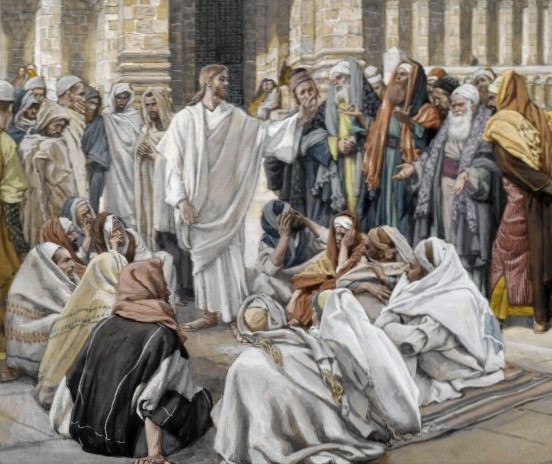- Feb 5, 2002
- 166,616
- 56,250
- Country
- United States
- Faith
- Catholic
- Marital Status
- Married
- Politics
- US-Others
There was an expression common among the rabbis of Jesus’ time, wherein one rabbi would ask another a question, and request that the answer be given while “standing on one foot.” This is a way of saying, be brief in your answer.
That idea may be behind the question that is raised in today’s Gospel by the scholar of law, who asks, “Teacher, which commandment in the law is the greatest?”
The text says that he asks this question of Jesus in order to “test” Him. In effect, he says to Jesus, “All right, let’s get right to the point. You’re talking about a lot of new things, but what is the greatest commandment?”
For this reflection, though, let’s just set aside the background hostilities and allow Jesus to recite the law, standing on one foot. In responding, Jesus recites the traditional Jewish Shema:
שְׁמַע יִשְׂרָאֵל יְהוָה אֱלֹהֵינוּ יְהוָה אֶחָד. Šĕmaʿ Yisĕrāʾel Ădōnāy Ĕlōhênû Ădōnāy eḥād. Hear, O Israel, the Lord is our God, the Lord is One.
The fuller text recited by Jesus is from Deuteronomy:
Hear, O Israel: The Lord our God, the Lord is one. Love the Lord your God with all your heart and with all your soul and with all your strength. These commandments that I give you today are to be upon your hearts (Deut 6:4-6).
Jesus then adds, also in common Rabbinic tradition, And the second is like it, love your neighbor as yourself. The whole law and the prophets depend on these two commandments.
That’s it—the whole law, standing on one foot.The first table of the law (the first three commandments): love the Lord your God. The second table of the law (commandments 4-10): love your neighbor.
There is value in noting several aspects of this summary:
Continued below.

That idea may be behind the question that is raised in today’s Gospel by the scholar of law, who asks, “Teacher, which commandment in the law is the greatest?”
The text says that he asks this question of Jesus in order to “test” Him. In effect, he says to Jesus, “All right, let’s get right to the point. You’re talking about a lot of new things, but what is the greatest commandment?”
For this reflection, though, let’s just set aside the background hostilities and allow Jesus to recite the law, standing on one foot. In responding, Jesus recites the traditional Jewish Shema:
שְׁמַע יִשְׂרָאֵל יְהוָה אֱלֹהֵינוּ יְהוָה אֶחָד. Šĕmaʿ Yisĕrāʾel Ădōnāy Ĕlōhênû Ădōnāy eḥād. Hear, O Israel, the Lord is our God, the Lord is One.
The fuller text recited by Jesus is from Deuteronomy:
Hear, O Israel: The Lord our God, the Lord is one. Love the Lord your God with all your heart and with all your soul and with all your strength. These commandments that I give you today are to be upon your hearts (Deut 6:4-6).
Jesus then adds, also in common Rabbinic tradition, And the second is like it, love your neighbor as yourself. The whole law and the prophets depend on these two commandments.
That’s it—the whole law, standing on one foot.The first table of the law (the first three commandments): love the Lord your God. The second table of the law (commandments 4-10): love your neighbor.
There is value in noting several aspects of this summary:
Continued below.

The Gospel, Standing on One Foot - A Homily for the 30th Sunday of the Year - Community in Mission
There was an expression common among the rabbis of Jesus’ time, wherein one rabbi would ask another a question, and request that the answer be given while “standing on one foot.” This is a way of saying, be brief in your answer. That idea may be behind the question that is raised in today’s...
blog.adw.org
